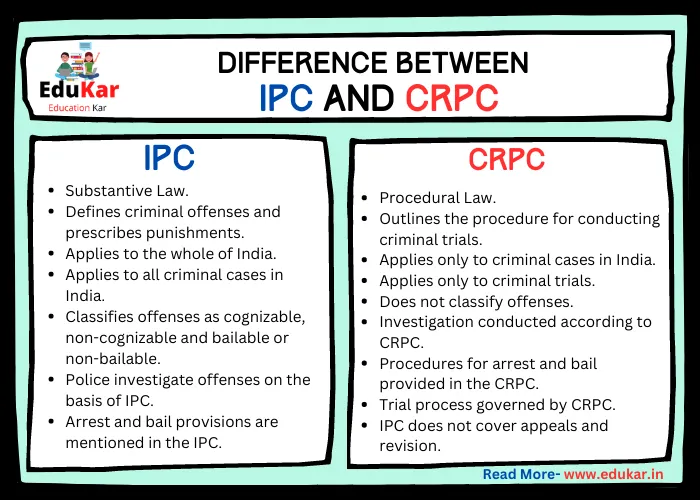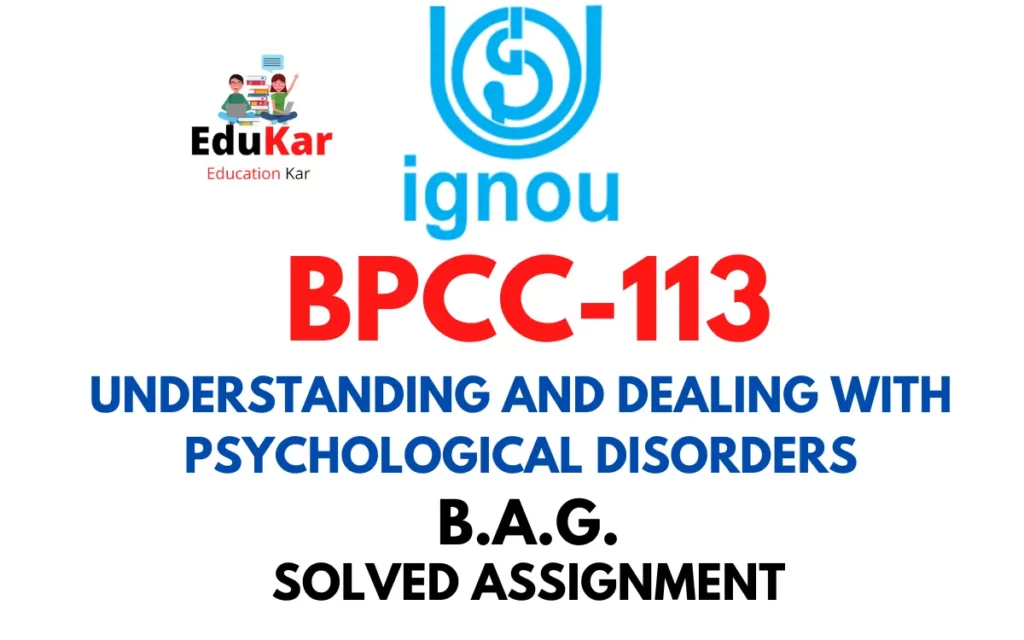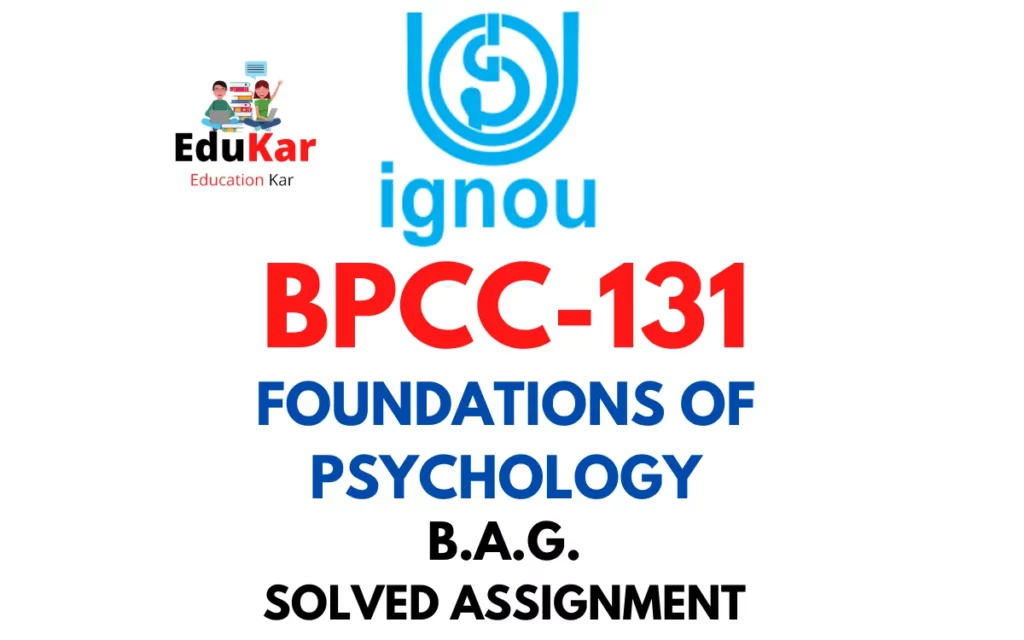Contents
- 1 1st Speech on Subhash Chandra Bose (20 min)
- 2 2nd Speech on Subhash Chandra Bose (15 min)
- 3 3rd Speech on Subhash Chandra Bose (10 min)
- 4 4th Speech on Subhash Chandra Bose (5 min)
- 5 5th Speech on Subhash Chandra Bose (3 min)
- 6 FAQs about Subhash Chandra Bose:
- 6.1 Who was Subhash Chandra Bose?
- 6.2 What should I include in a speech on Subhash Chandra Bose?
- 6.3 What are some important quotes by Subhash Chandra Bose that I can use in my speech?
- 6.4 How long should my speech on Subhash Chandra Bose be?
- 6.5 What are some tips for delivering a powerful speech on Subhash Chandra Bose?
Looking for a powerful and informative speech on Subhash Chandra Bose? These 5 Best speeches on Subhash Chandra Bose will explore the life and legacy of this iconic Indian nationalist leader, highlighting his contributions to India’s struggle for independence. Whether you’re a student, teacher, or history enthusiast, this speech is sure to inspire and educate.
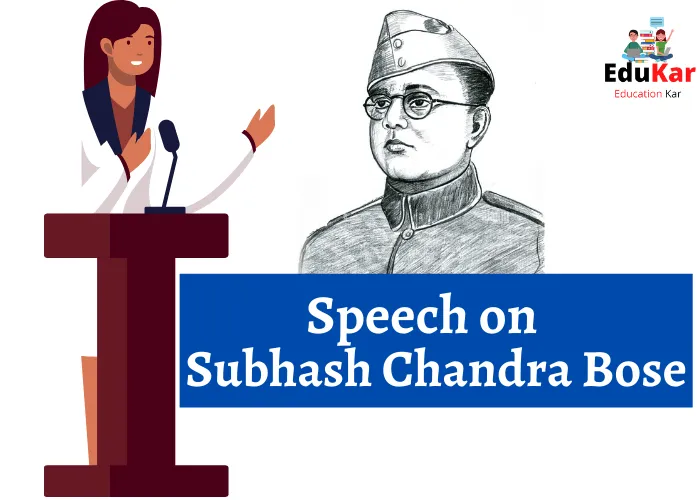
1st Speech on Subhash Chandra Bose (20 min)
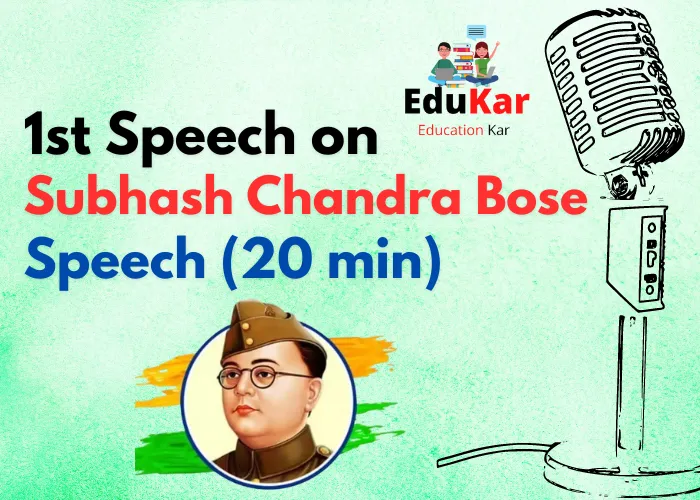
Respected audience,
It is my great pleasure to talk to you today about one of the most celebrated and revered leaders of India’s struggle for independence, Netaji Subhash Chandra Bose.
Subhash Chandra Bose was born on January 23, 1897, in Cuttack, Odisha, was an Indian nationalist and a prominent figure in the Indian independence movement. He was a charismatic leader who inspired millions of Indians to fight for their freedom from British rule.
Bose was the ninth child of Janakinath Bose, a prominent lawyer, and Prabhavati Devi. From a young age, Bose was a brilliant student and excelled in academics. He went on to study at the University of Calcutta and later at the University of Cambridge in England. However, he was disillusioned with the British system and returned to India to fight for the country’s independence.
Bose started his political career as a member of the Indian National Congress, but he later formed the Forward Bloc in 1939, after disagreeing with the Congress’s policies. He believed that India’s independence could only be achieved through an armed struggle, and he was willing to use any means necessary to achieve that goal.
During World War II, Bose sought the help of Nazi Germany and Imperial Japan to secure weapons and supplies for his Indian National Army (INA). The INA was formed with Indian prisoners of war who had been captured by the Japanese in Southeast Asia. Bose traveled extensively throughout Asia, meeting with leaders and politicians, and even attempting to seek help from the Soviet Union.
Bose’s ultimate goal was to march into India with his INA and liberate the country from British rule. However, his plans were foiled, and he was forced to flee to Germany, where he continued to work for India’s freedom. Unfortunately, Bose died in a plane crash in August 1945, under mysterious circumstances.
Netaji Subhash Chandra Bose’s contribution to the Indian independence movement cannot be overstated. He was a visionary leader who inspired millions of Indians to fight for their freedom. His call for “Jai Hind” continues to resonate with Indians to this day.
Bose was a man of great courage, determination, and conviction. He believed that India’s independence was a cause worth fighting for and was willing to sacrifice everything for it. His leadership and bravery continue to inspire generations of Indians.
Today, on his birth anniversary, we pay tribute to Netaji Subhash Chandra Bose and remember his contribution to India’s freedom struggle. We remember his commitment to the cause of India’s independence and his unwavering belief in the power of the people.
In the end, Netaji Subhash Chandra Bose was a leader who lived and died for India’s freedom. He was a man of great integrity, courage, and vision, and his legacy will continue to inspire Indians for generations to come. Let us remember his life and work and strive to continue his legacy by working towards a better India.
Thank you.
2nd Speech on Subhash Chandra Bose (15 min)
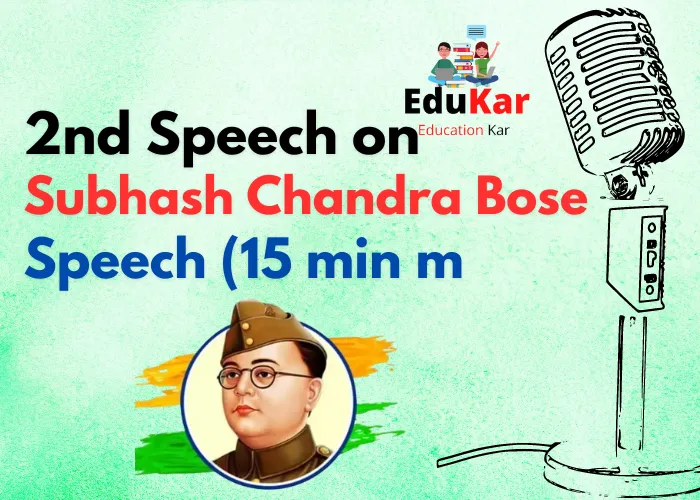
Ladies and Gentlemen,
Today, I would like to talk about one of the most renowned and inspiring leaders in Indian history, Subhash Chandra Bose. Bose, also known as “Netaji,” was a revolutionary leader who dedicated his life to fighting for India’s independence from British colonial rule.
Born on January 23, 1897, in Cuttack, Orissa, Bose belonged to a well-educated and affluent family. He was a brilliant student who showed exceptional skills in academics as well as extracurricular activities. After completing his education in England, he returned to India to join the Indian Civil Service. However, he soon realized that his true calling lay in serving the nation and fighting for its freedom.
In 1921, Bose joined the Indian National Congress, where he quickly rose through the ranks due to his leadership skills and dedication to the cause of Indian independence. However, he soon became disillusioned with the Congress’s moderate approach towards the British, which he believed would not lead to independence. Therefore, he formed the Forward Bloc in 1939, a political party that advocated for complete independence from British rule.
Bose’s most significant contribution to the freedom struggle was his formation of the Indian National Army (INA) in 1942. The INA was an army of Indian soldiers who had been captured by the Japanese during the Second World War and had pledged their allegiance to the cause of Indian independence. Bose led the INA from the front, instilling a sense of patriotism and nationalism among the soldiers. The INA’s battle cry, “Chalo Delhi” (Let’s march to Delhi), became a symbol of the freedom struggle.
Bose’s leadership and military skills were evident in the INA’s successful military campaigns in Burma and Northeast India. Although the INA did not succeed in driving the British out of India, it played a significant role in galvanizing the Indian masses towards the freedom struggle. Bose’s slogan of “Jai Hind” (Victory to India) became a rallying cry for the freedom fighters.
Unfortunately, Bose’s life was cut short when he died in a plane crash in 1945. However, his legacy continued to inspire future generations of Indians to fight for their freedom. Bose’s contribution to the freedom struggle was significant, and his name will always be remembered as one of the greatest leaders of India.
In conclusion, Subhash Chandra Bose was a visionary leader who dedicated his life to fighting for India’s independence. He was a true patriot who believed in the power of the people and was not afraid to take bold and decisive actions to achieve his goals. His leadership and military skills were unmatched, and his legacy continues to inspire millions of Indians to this day. As we celebrate his life and legacy, let us remember his words, “Give me blood, and I will give you freedom.”
Thank you.
3rd Speech on Subhash Chandra Bose (10 min)
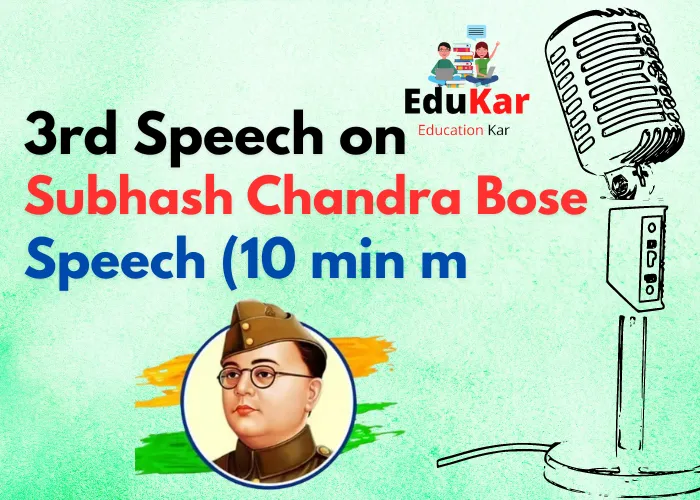
Good Morning/Afternoon/Evening Everyone
It is a great honor for me to stand before you and speak about one of the most influential and inspiring leaders of India, Subhash Chandra Bose.
Subhash Chandra Bose, fondly known as Netaji, was born on January 23, 1897, in Cuttack, Orissa. He was the ninth child of Prabhavati Devi and Janakinath Bose. Netaji was a brilliant student and graduated from the University of Calcutta with a Bachelor of Arts degree in 1918. Later, he went to England and appeared for the Indian Civil Service examination but was unsuccessful in his attempt.
However, this did not discourage Netaji from pursuing his passion for serving the country. He joined the Indian National Congress in 1921 and soon became an active member of the party. Netaji was a great orator and a dynamic leader who inspired many people to join the freedom movement.
Netaji believed that non-violent methods of protest were insufficient to gain independence for India. He felt that the British would only understand the language of force, and therefore, he advocated for a more aggressive approach to achieve freedom. This led to his differences with Mahatma Gandhi, who believed in non-violence as the only way to achieve freedom.
In 1939, Netaji resigned from the Congress and formed the Forward Bloc, which aimed at achieving complete independence for India. He traveled extensively across the country, inspiring people to join the movement. He was imprisoned several times by the British for his activities.
During World War II, Netaji sought help from Germany and Japan to gain support for India’s independence. He formed the Indian National Army (INA) in collaboration with the Japanese, which aimed at freeing India from British rule. The INA fought alongside the Japanese army in Burma and other parts of Southeast Asia. Netaji’s leadership and vision inspired many soldiers to join the INA.
Netaji was a charismatic leader who inspired people with his speeches and actions. He believed that freedom was the birthright of every Indian and was willing to sacrifice everything to achieve it. He famously said, “Give me blood, and I shall give you freedom.”
Unfortunately, Netaji’s life was cut short when he died in a plane crash in 1945. However, his legacy and contribution to the Indian freedom struggle will always be remembered.
Netaji’s life and work teach us many important lessons. His determination, courage, and selflessness continue to inspire generations. He believed in the power of people and their ability to bring about change. He also believed in taking bold and decisive action, even in the face of great challenges.
In the end, Netaji Subhash Chandra Bose was a visionary leader who dedicated his life to the service of the country. His legacy will always be remembered as one of the greatest contributors to India’s independence struggle. We should all strive to follow in his footsteps and work towards building a better India for future generations. Thank you.
4th Speech on Subhash Chandra Bose (5 min)
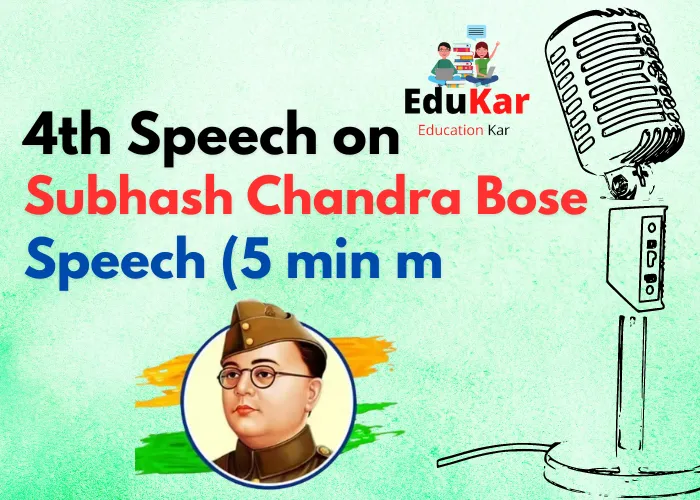
Good Morning/Afternoon/Evening Everyone
Today, I stand before you to speak about one of the most iconic leaders of India, Subhash Chandra Bose. Fondly known as Netaji, he was a revolutionary who dedicated his life to the freedom struggle of India.
Subhash Chandra Bose was born on 23rd January 1897 in Cuttack, Odisha, to a well-educated family. He was a brilliant student and completed his education from the University of Calcutta. Bose was deeply influenced by the teachings of Swami Vivekananda, and his love for his motherland inspired him to join the Indian National Congress.
Bose’s unwavering dedication to the Indian independence movement led him to become the President of the Indian National Congress in 1938. However, his differences with Mahatma Gandhi and other Congress leaders regarding the approach to gain independence led him to resign from the Congress in 1939.
He then formed the Forward Bloc, a political party that aimed to unite all those who were fighting for India’s independence. His political career was full of controversies, but his passion for freedom never wavered.
Bose believed that the Indian freedom struggle could only be successful if India had its army to fight against the British. With this vision, he formed the Indian National Army (INA) in 1942. The INA comprised Indian soldiers who were captured by the British Army during World War II.
Bose’s leadership and charisma inspired the soldiers of INA, and they were ready to fight for India’s independence. The INA soldiers marched towards India, but they were stopped by the British Army in Burma. The INA was defeated, and Bose had to flee to Japan to avoid capture.
In Japan, Bose formed the Provisional Government of Free India and declared war against the British. He also sought the support of other countries like Germany and Italy in India’s freedom struggle. However, his efforts were in vain, and India’s independence was ultimately achieved through peaceful means.
Subhash Chandra Bose’s contribution to the Indian freedom struggle cannot be measured in words. He was a true patriot who sacrificed his life for his motherland. His ideologies, leadership qualities, and passion for freedom continue to inspire generations even today.
Bose’s famous slogan, “Jai Hind,” which means “Victory to India,” is still used to this day to express patriotism and love for the country. His legacy lives on, and his contributions to the Indian independence movement will never be forgotten.
At the end, Subhash Chandra Bose was a revolutionary leader who dedicated his life to India’s freedom struggle. His passion for freedom, his ideologies, and his leadership qualities continue to inspire millions of people even today. His contribution to India’s independence movement will always be remembered, and his legacy will continue to inspire generations to come.
Thank you. Jai Hind!
5th Speech on Subhash Chandra Bose (3 min)
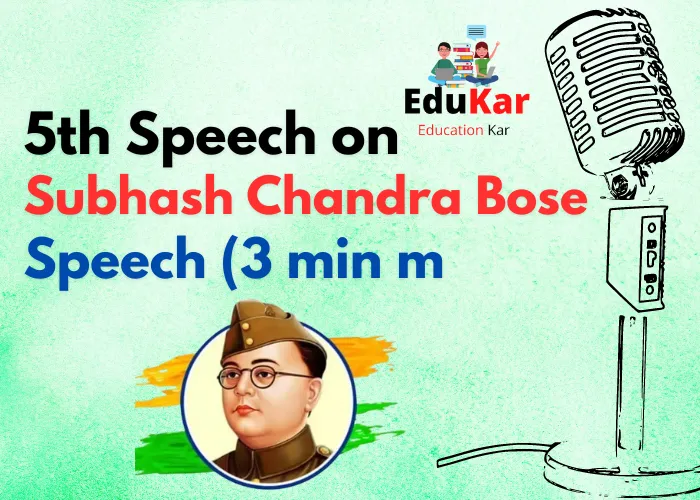
Good Morning/Afternoon/Evening Everyone
Today, I would like to talk to you about one of India’s most iconic and cherished freedom fighters, Subhash Chandra Bose.
Subhash Chandra Bose was born on January 23, 1897, in Cuttack, Orissa, India. He was the ninth child of a well-respected lawyer, Janakinath Bose, and Prabhavati Devi. Growing up, Bose was known for his intelligence, passion, and fierce determination.
Bose was a brilliant student and went on to study at the University of Calcutta, where he completed his B.A. in Philosophy. After completing his studies, Bose went to England to pursue higher studies at Cambridge University. It was there that he joined the Indian National Congress and began his journey towards Indian independence.
Bose was a gifted speaker, and his speeches inspired thousands of Indians to join the struggle for freedom. In 1928, Bose was elected as the President of the Indian National Congress. However, he resigned from his post in 1939, due to differences with other members of the party.
During World War II, Bose formed the Indian National Army (INA) to fight against the British. He travelled to Germany and Japan seeking their support, and finally, in 1943, the Japanese agreed to help him form an army to fight for India’s independence. The INA fought bravely alongside the Japanese army in Burma and India.
Bose’s motto for the INA was “Jai Hind,” which became the battle cry for Indian soldiers fighting for independence. The INA’s successes in battle were an inspiration to Indians all over the world, and Bose became a hero to many.
Sadly, Bose’s life was cut short in a plane crash in Taiwan in 1945. His death was a great loss to the Indian independence movement, but his legacy continues to inspire generations of Indians to this day.
Bose was a true patriot who dedicated his life to the service of his country. He was a fearless leader who never gave up in the face of adversity. His unwavering commitment to the cause of Indian independence and his tireless efforts to achieve it have made him a legend in India’s history.
Bose’s life and legacy are a reminder to all of us that we should never give up on our dreams, no matter how difficult they may seem. His courage, determination, and love for his country continue to inspire us to this day.
In conclusion, Subhash Chandra Bose was a great patriot, freedom fighter, and leader. He dedicated his life to the service of his country and fought tirelessly for India’s independence. His legacy continues to inspire us to this day, and we should all strive to live up to his example of courage, determination, and selflessness. Thank you.
FAQs about Subhash Chandra Bose:
Who was Subhash Chandra Bose?
Subhash Chandra Bose was a prominent Indian nationalist leader who played a significant role in India’s struggle for independence from British rule. He was born on January 23, 1897, in Cuttack, Odisha, and died on August 18, 1945, in a plane crash.
What should I include in a speech on Subhash Chandra Bose?
Your speech should cover important aspects of Bose’s life, such as his early years, his role in the Indian National Congress, his leadership of the Indian National Army (INA), and his contribution to India’s freedom struggle. You can also discuss his ideology, his vision for India’s future, and his impact on the country’s history.
What are some important quotes by Subhash Chandra Bose that I can use in my speech?
Some of the most famous quotes by Bose include “Give me blood, and I will give you freedom,” “Freedom is not given, it is taken,” “It is our duty to pay for our liberty with our own blood,” and “No real change in history has ever been achieved by discussions.”
How long should my speech on Subhash Chandra Bose be?
The length of your speech will depend on the occasion and the guidelines given to you. Generally, a speech on Subhash Chandra Bose can range from 5 to 20 minutes.
What are some tips for delivering a powerful speech on Subhash Chandra Bose?
To deliver a powerful speech on Subhash Chandra Bose, you should research his life and legacy thoroughly and organize your thoughts into a clear and coherent structure. Practice your speech several times to improve your delivery and confidence. Use anecdotes, quotes, and historical facts to engage your audience and create an emotional impact. Finally, speak with passion and conviction to inspire your listeners.

![Best 5 Speech on Yoga [Long & Short] Speech-on-Yoga](https://edukar.in/wp-content/uploads/2023/03/Speech-on-Yoga.webp)



